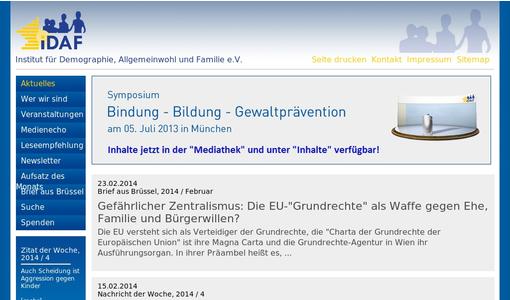Simultaneously, alarming reports make the news that, according to the new OECD criteria, more than every forth child in Germany lives in conditions of poverty and therefore under extreme economic stress. This holds true even for the average family of four with an average full-time gross salary of 30,000€ (table 1). What is striking is that since 1965 poverty has doubled every ten years while birth rates have halved since then. How does this all add up?
[...] In fact, these astronomically large sums do not reflect the solution but rather the problem per se. They namely originate from the common economic concept, which has developed in the course of the industrialisation: The separation of household and gainful employment in terms of time and space. The triumph of the market and money economy, the money economy's intrinsic chrematistic principle which focuses on the maximisation of the exchange value and the hierarchic nature of the separation of private matters and gainful employment have created an economic information and appraisal system in which reproductive achievements have been systematically suppressed because of their failure to create exchangeable value. Private households are by definition only seen as places of consumption and their aggregate added-value is being ignored. In accordance with this one-sided view, the gross national product would decrease for instance if a bachelor marries his former housekeeper - an absurd conclusion which economist Friedrich List commented on so trenchantly 150 years ago: " The man who breeds pigs is, according to this school, a productive member of the community, but he who educates children is a mere non-productive." Children are a purely private matter, natural products that are for free. They are only appreciated by the arithmetic unit of economics as ready-made human capital.
[...] The enormous volumes which are declared as "family support" in this country thus do not reflect special appreciation for families but, on the contrary, total disrespect for what families are and achieve - namely primary producers of our existence, our abilities, our prosperity, our security etc. The productivity of our economy is no natural law but rather the end product of a production chain, which starts with the education of teachable children in those families. In the same way one could add up education, pensions, health care, nursing care, tax exemptions for the 70 percent of the population, which do not have to support any children and one would easily obtain 500 billion Euro in "support for the childless"! However, no one would come up with such an idea. So when it comes to families we are dealing with a divided awareness.
[...] Metaphorically speaking: the state is not a peasant and does not accomplish anything by itself. If it is to hold a pork feast, it needs to get the sow from somewhere. If it offers three steaks to the families, they cannot be considered gifts anymore if it has taken the slaughtered sow from the family beforehand or if the family has borne the major part of the fattening itself. At best this would be the partial return of stolen goods. Child benefit is exactly that, because the state essentially returns what it has previously collected by taxing the children's breadline. It would also be unfair if others who contributed less or nothing to the fattening received even more steaks. That is the case for the period of maternal leave in the pension scheme: Not only as a fig leaf does it cover up the fact that mothers are deprived large-scale of the fruit of their parenting, but it is on top of that entirely paid by the children of exactly those mothers; the big winners are people who have not invested much or anything at all in human capital but who receive a full pension from other people's children.
[...] I have dealt with these questions for the first time during the course of the so-called "rubble women proceedings" at the Federal Constitutional Court in 1992. The root of the proceedings was the "transfer robbery" exemplified by the case of Rosa Rees, a mother of nine, whose children paid monthly pension contributions of 7000 DM in total (without "employer's contribution"), but Rosa Rees only received 260 DM in pension herself. The opposing party used the astronomically large transfer payments that families allegedly received as their main argument. However, these computations could be refuted - as detailed in the decree:
"Essentially it remains that although the state aims for a burden-sharing for families, raising children is seen as a private matter while provision for old age is considered a societal remit. [...] The case brought forward by the appellants that, due to the current legal situation, transfer payments are being made from families with several children to those already better-off with one child or no children does not only concern the pension law but beyond that the burden-sharing for families in general. It allows for ... the conclusion that the legislator has only partially fulfilled its protective mandate as stipulated in the German Constitution Article 6 Section 1 (Note: "Marriage and the family shall enjoy the special protection of the state."). ... Notwithstanding the above, no matter in what way the means for the compensation will be generated, it is to be ensured that with every reform step the discrimination against families is effectively reduced. Being bound to the constitutional mandate, the legislator needs to discernibly take account for this progress. "
[...] The question about the most important requirement for a "prospective family policy" is easily answered: uphold the constitution and implement the decree from Karlsruhe!
Dr. Jürgen Borchert is a judge at the Hessian Superior State Social Court. The article is a shortened reproduction of his presentation "Mehr als schöne Worte?" - Familienförderung auf dem Prüfstand: Was für Familien wirklich getan wird" held at the conference "Familie im Wandel - Anforderungen an eine Familienpolitik mit Zukunft" in March 2008. The whole article can be found on: http://www.der-paritaetische.de/...

